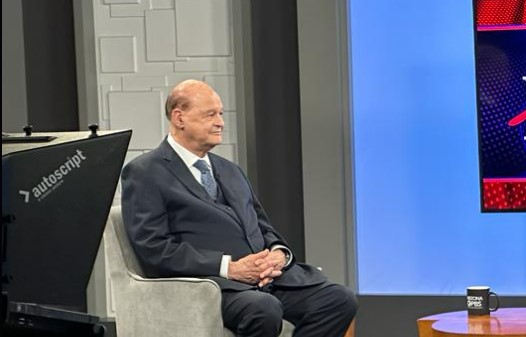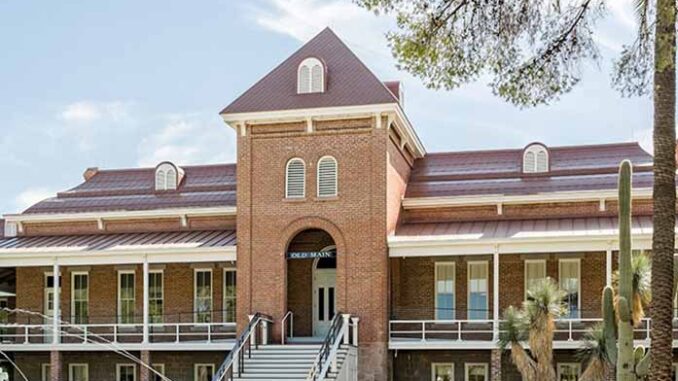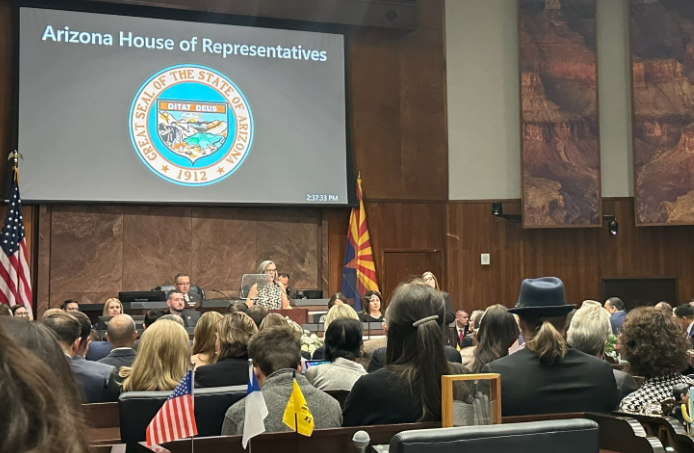
by Elizabeth Troutman | Jan 23, 2024 | Education, News
By Elizabeth Troutman |
Western Maricopa Education Center reported high attendance and academic achievement scores in the fall 2023 semester.
West-MEC is a career and technical education school district with 45,000 students across its four campuses and 49 high schools in the West Valley.
“West-MEC provides students with the technical and professional skills to realize their career dreams and achieve economic independence,” West-MEC Assistant Superintendent Stephen Weltsch said. “This responsibility is too important to leave to chance; the district’s learning system includes sophisticated metrics to track continual student progress.”
More than two-thirds of central program students earned at least one industry-recognized certificate for a total of 2,812 credentials. This marks an increase of more than 35% as compared to last year at this time.
More than half of the credentials earned are required or preferred by employers of each program’s respective fields. One-hundred percent of students enrolled in programs at West-MEC’s central campus earned credit during the fall semester, and 99% achieved a C or higher.
“Even though we are only halfway through the school year, these are phenomenal achievements by West-MEC’s students,” Weltsch said.
West-MEC also reported high attendance rates, with 95% of students having less than ten absences, 71% less than five, and 15% of students with zero absences.
“These high attendance rates are a true testament to West-MEC’s staff and its students’ engagement, commitment, and passion for the program they are in,” the Jan. 19 news release reads.
Elizabeth Troutman is a reporter for AZ Free News. You can send her news tips using this link.

by Corinne Murdock | Jan 21, 2024 | Economy, Education, News
By Corinne Murdock |
Gov. Katie Hobbs’ proposed education funding plan is “dangerous and unsustainable” according to State Treasurer Kimberly Yee.
Hobbs’ plan, if passed by the state legislature, would renew Proposition 123 for another decade and increase the state land trust fund to nearly nine percent. In a statement on Tuesday, the treasurer accused the governor of irresponsible mismanagement of taxpayer funds amid record inflation.
“Governor Hobbs wants to raid the land trust to cover for her mismanagement of the state budget and overzealous spending plans in an ever-increasing inflationary environment,” said Yee.
Yee warned that Hobbs’ plan would violate the Enabling Act, the terms under which Arizona achieved statehood in 1910. She recommended a four to five percent distribution, declaring Hobbs’ vision “unfeasible” based on past performance.
“My office has not reported a 10-year return over 8.9 percent in nearly two years. Over the span of the last 10 years, only 32 months have had a 10-year return over 8.9 percent,” said Yee.
That’s something the governor acknowledged in her announcement of her plan: the average 10-year annualized return amounts to just over seven percent.
Proposition 123, the Arizona Education Finance Amendment, was a voter-approved 2016 constitutional amendment to increase education funding by $3.5 billion over a decade using monies from the general fund and state land trust fund. Yee oversees the land trust fund.
Although Yee declared the funding plan wasn’t sustainable, Hobbs claimed that there were ample funds going unused.
“[We shouldn’t] let billions of dollars accrue in a bank account and do nothing to address our immediate needs,” said Hobbs.
Hobbs marketed her renewal plan as a means of increasing education funding without raising taxes.
“The choice is clear: we can give our children a quality education or let billions of dollars stand idle without addressing our immediate needs,” said Hobbs.
Under the governor’s plan based on a decade-long average distribution, 2.5 percent will continue general school funding ($257 million), 4.4 percent will raise educator compensation ($347 million), 1.5 percent will increase support staff compensation ($118 million), and .5 percent will invest in school capital for safety and security ($39 million).
State Sen. Christine Marsh (D-LD04) is sponsoring the bill with the governor’s plan. Marsh also sits on the Senate Education Committee.
“Renewing and expanding this vital funding source for our schools is crucial to ensuring Arizona’s students receive the high quality education they deserve,” said Marsh.
Corinne Murdock is a reporter for AZ Free News. Follow her latest on Twitter, or email tips to corinne@azfreenews.com.

by Elizabeth Troutman | Jan 17, 2024 | Education, News
By Elizabeth Troutman |
Families and educators will gather on Saturday for a fair celebrating National School Choice Week.
“National School Choice Week is a time for families to explore different options available to meet their children’s educational needs. It is an occasion for schools to showcase what they do best for their students,” said Barbara Duncan, vice president of quality schools at Choose a School.
“It is an opportunity for leaders to see the schools in their districts in action and to ensure all students have a right to an excellent educational option,” Duncan continued.
The school fair and family fun night hosted by Choose a School Arizona will take place at the Children’s Museum of Phoenix on Saturday, Jan. 20 from 6-8 p.m..
Choose a School Arizona uses social media, strategic events, and one-on-one parent outreach to help families find the best education for their children and help quality schools tell their stories and find students.
More than 50 school booths and vendors will attend, including charter schools, college prep schools, microschools, Autism academies, Catholic schools, and homeschool support groups.
This will be the largest Phoenix-area celebration of National School Choice Week, which highlights “education options and the joy of learning.”
Activities will include music from the AZ School of the Arts Jazz band, a presentation of colors by the PVS School’s Space Force ROTC students, face painting, a flash mob, and a celebratory red and yellow balloon drop.
In addition to visiting booths, families can explore the museum, make balloons, eat snacks, and enjoy a photo booth.
Community sponsors for this event include Mrs. Klein’s Pickle Co. in Phoenix.
More than 750 attendees are expected to attend the event, which is open to the press and the public.
Information at the fair will be available in both English and Spanish thanks to Conoce tus Opciones Escolares, a project of the National School Choice Awareness Foundation. Families can learn more and RSVP for the free event at phoenixschoolfair.com or phoenixferiaescolar.com.
The Children’s Museum of Phoenix is located at 215 N. 7th St.
Elizabeth Troutman is a reporter for AZ Free News. You can send her news tips using this link.

by Daniel Stefanski | Jan 15, 2024 | Education, News
By Daniel Stefanski |
Arizona’s Superintendent of Public Instruction is holding the state’s schools accountable for educating students about the Holocaust.
Last week, State Superintendent of Public Instruction Tom Horne announced that he requested “all Arizona district and charter schools report their compliance with state law that requires students to be taught about the Holocaust and other genocides.”
In a statement that accompanied his news release, Horne said, “During the past three months we have learned all-too-well how many people are ignorant about the realities of the Holocaust and other genocides of history. We have heard about pro-Hamas and anti-American propaganda being spread in a high school student club, students being intimidated because of their ethnicity, and we have seen pro-Hamas protests on college campuses.”
The Republican superintendent expressed his gratitude for the law granting his office the ability to hold schools accountable for the statutory teaching of this educational material. He added, “Expressions of hatred like this are unacceptable in an educational setting and a powerful way to combat this scourge is with learning. Students would not be vulnerable to antisemitic propaganda if they had received proper Holocaust instruction. I’m grateful state law exists to require instruction on the Holocaust and other genocides, and it is important to ensure that districts and charter schools are in compliance.”
The law that the state’s schools chief referenced was HB 2241, which was passed by the Arizona Legislature and signed into law by then-Governor Doug Ducey. The bill was sponsored by Alma Hernandez, a Democrat. It passed both chambers with almost unanimous support. Ducey, in his letter to then-Secretary of State Katie Hobbs, informed her that he was signing the legislation to “ensure that we continue to teach our students the history of past atrocities, which in return will instill greater compassion, critical thinking, societal awareness, and educational growth in our students.”
Horne’s deadline for Arizona schools to report to the state Department of Education is January 24. He informed schools that his department “provides resources, training, and support for educators in meeting House Bill 2241.”
Daniel Stefanski is a reporter for AZ Free News. You can send him news tips using this link.

by Corinne Murdock | Jan 11, 2024 | Education, News
By Corinne Murdock |
On Tuesday, the University of Arizona (UArizona) announced a $2.5 million settlement with the family of slain Professor Thomas Meixner.
Former UArizona graduate student Murad Dervish fatally shot Meixner in October 2022. In a copy of the settlement obtained by AZ Free News, UArizona also agreed to establish and fund an endowed professorship in the Department of Hydrology and Atmospheric Sciences (HAS) in Mexiner’s name.
UArizona also agreed to provide continued mental health treatment to HAS faculty, staff, and students directly and immediately affected by the shooting, as well as a tuition and fee waiver to certain HAS students directly and immediately affected by the shooting. For the latter provision, the university will apply the tuition and fee waiver prospectively and retroactively to the semester in which the events preceding the shooting began.
The Meixner family filed a notice of a claim against UArizona last March shortly after the disbanding of an independent faculty committee investigating the shooting. They originally sought $9 million from the university.
In a statement issued on Tuesday, Meixner’s wife, Kathleen, said that they’re focused on preventing similar tragedies in the future. She ended on a note of support for the university that her husband knew and loved.
“So often in the aftermath of school shootings, we learn all the ways that they could and should have been prevented. That is exactly what happened here,” said Kathleen. “My family and I will continue meeting with the University of Arizona President, its Police Chief, and multiple other members of the University administration to make certain it upholds its commitment to make our community safer. Together, we will Bear Down, and find our way forward with courage and love for the Wildcat community which Tom cherished.”
In their original claim, the Meixner family accused the university of “repeatedly ignoring the clear and present danger” that Dervish posed by “openly advertis[ing] his intent to murder.” The family’s notice offered a summary of Dervish’s actions and escalations in threats for nearly a year leading up to the shooting, as well as details of a previous order of protection against Dervish from a previous university that UArizona failed to catch.
Meixner’s family alleged that Dervish’s intentions were so well known that Meixner’s last words were: “I knew you were going to do this!” Dervish violated the terms of his expulsion and ban from campus, as well as a no contact order, prior to the shooting.
“Dr. Meixner’s murder was not a random act of violence. The university knew Dervish planned to kill him and allowed it,” said the family. “Dervish’s homicidal intentions, capacities and history, as well as his utter disregard for the university’s unenforced sanctions, were so patently obvious that the University’s multiple failures to protect Dr. Meixner constitute an outrage.”
As reported previously, Dervish had a lengthy history of violence and crime. His criminal background included three prison stints and several instances of attempted murder: a pizza man at Penn State University and his own mother. He had also assaulted his father previously.
In a video of his interrogation following the shooting, Dervish expressed satisfaction over Meixner’s death. His trial date was pushed back to this May pending a doctor’s report on Dervish’s sanity.
“Well, at least I fulfilled my mission,” said Dervish.
In a press release issued Tuesday, UArizona alluded to the terms of the settlement’s non-monetary commitments to support the well-being of those affected by the shooting, as well as their agreement to have the Meixner family assist in future planning and implementation of safety and security measures.
Corinne Murdock is a reporter for AZ Free News. Follow her latest on Twitter, or email tips to corinne@azfreenews.com.

by Corinne Murdock | Jan 9, 2024 | Education, News
By Corinne Murdock |
Gov. Katie Hobbs is claiming that the state’s school choice program is rife with abuse and in need of serious reform.
In her State of the State address on Monday, Hobbs claimed the Empowerment Scholarship Account (ESA) program lacks accountability and transparency, alluding to media reports of questionable and controversial expenditures — some of which were debunked previously.
“We have seen a steady stream of news coverage around unacceptable and sometimes downright outrageous use of taxpayer money under this program, including water park admissions, ski passes, and luxury car driving lessons,” said Hobbs.
The Arizona Department of Education (ADE) issues quarterly reports on the ESA program; the latest was released several days prior to Christmas. These reports include the program award amount received by students, as well as the number of orders and reimbursements approved and rejected.
ADE also provides lists of allowable and disallowable expenses, both updated last March. The ADE debunked one of Hobbs’ claims of “outrageous” expenditures last summer. In a statement, ADE clarified that it rejects expenditures for water park admissions.
An ABC15 review of 2022-23 ESA program expenditures found that ADE issued nearly 80 approvals for driving lessons and over 100 approvals for ski passes. However, that report didn’t distinguish whether those expenditures were made in 2022 under former ADE Superintendent of Public Instruction (SPI) Kathy Hoffman, or in 2023 under current SPI Tom Horne. The difference matters because, as Horne stated in November, similar “outlandish purchases” occurred under Hoffman, not him.
“Approvals like those came during the prior superintendent’s administration led by a friend of the leader of Save Our Schools, and one of my first acts in office was to put an end to it,” said Horne.
As reported by AZ Free News last January, Hoffman’s administration of the ESA program was described as neglectful and improper. In addition to severe understaffing and hundreds of thousands of unfulfilled expense requests, the Horne administration discovered questionable expense approvals such as espresso machines.
Hoffman’s administration of the ESA program has been something that Horne has pointed out repeatedly in refuting claims of improper ESA program expenditures.
“The frivolous ESA spending approvals occurred under the administration of the Governor’s friend, Kathy Hoffman,” said Horne in another statement last month.
As of Monday, over 73,200 students were in the ESA program.
Hobbs’ criticism of the ESA program comes days after she announced a plan to effectively dismantle the ESA program. Monday’s speech made mention of several aspects of this proposed plan: fingerprint background checks for private school educators, a new audit authority for the auditor general specific to monitoring ESA expenditures, and requirement of attendance at a public school for at least 100 days to qualify for the program.
The governor’s plan also aims to require private schools to accommodate Individualized Learning Plans and Section 504 Plans, prohibit private schools from increasing tuition costs at a rate higher than inflation, require private schools to meet certain education requirements, and require ADE to disclose which parental and student rights are waived upon entrance into the ESA program as well as graduation and chronic absenteeism rates.
At least one of Hobbs’ proposals addresses a practice already in place, according to Horne: accountability in the form of manual reviews of purchases over $500 and rejection of non-academic expenditures.
Horne explained in a statement that his staff reviews all expense requests, regardless of amount, leading to a rejection of over 12,000 purchase order requests and the suspension of nearly 2,200 accounts totaling $21 million due to public school enrollment.
“My job is to administer the ESA program in line with state law, and if changes are made, the Department of Education will follow them,” said Horne. “My office already reviews all expense requests regardless of amount, unlike the previous superintendent who approved many frivolous requests.”
That $500 threshold appears to be related to another false expenditure-related claim echoed by Hobbs from the activist group, Save Our Schools Arizona. The activist group implied in a viral post picked up by various media outlets that ADE approved an expenditure of over $500 for a Lego set.
“Contrary to a falsified document tweeted by Save Our Schools, no ESA parent has been reimbursed $500 to buy Legos,” said Horne. “To be clear, district, charter and ESA students are allowed to use Legos. The issue here is a pattern of lying. Save Our Schools admitted they fabricated a document to make it look like a parent made a $500 purchase when she did not. By doing so they have misled both the Governor and a prominent newspaper columnist, both of whom have retweeted this lie.”
Although the claim was debunked, Hobbs didn’t retract her viral accusation of ESA program mismanagement.
“Your taxpayer dollars are being used to buy $500 Lego sets because partisan politicians refuse to place limits on school vouchers,” said Hobbs.
Corinne Murdock is a reporter for AZ Free News. Follow her latest on Twitter, or email tips to corinne@azfreenews.com.






